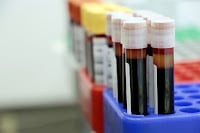Patients With Major Depression May Experience Insulin Resistance

Insulin resistance “is a known risk factor for somatic and brain-based disorders, including cardiovascular disease, Alzheimer disease, and major depressive disorder,” wrote Kathleen Watson, Ph.D., of the Center for Neuroscience in Women’s Health at Stanford Medicine and colleagues. “However, there is little evaluation of how [insulin resistance] is associated with specific features of major depression.”
Watson and colleagues used data from 1,269 participants in the Netherlands Study of Depression and Anxiety who had provided blood samples as part of the study. The participants were divided into three diagnostic groups: those with current MDD, remitted MDD, and no history of the disorder. The researchers evaluated the participants’ levels of insulin resistance with two biomarkers: the quantitative insulin sensitivity check index (QUICKI) and the triglyceride to high-density lipoprotein (HDL) ratio. Depression status was assessed via the Composite International Diagnostic Interview, version 2.1; depression severity was assessed via the Inventory of Depressive Symptomatology; and depression chronicity over the preceding four years was assessed via the life chart interview.
Patients with current MDD were more likely to have insulin resistance compared with those with no history of the disorder. Patients in remission from MDD appeared no more likely to have insulin resistance than those with no history of the disorder, however. Further, both measures of insulin resistance were positively associated with depression severity among participants with current MDD.
The researchers also found that depression chronicity was associated with the triglyceride-HDL ratio, but not with the QUICKI. Additionally, the participants who were insulin resistant were older, less educated, and had higher body mass index than those who were insulin sensitive, the authors found.
The findings suggest that insulin resistance, “is a state, rather than a trait, biomarker of depression,” the authors wrote. “Taken together, these biomarkers of metabolic dysfunction represent simple, clinically accessible methods of identification of [insulin resistance] among currently depressed patients,” they concluded.
For related information, see the Psychiatric News article “SGAs Increase Teens’ Abdominal Fat, Decrease Insulin Sensitivity.”
(Image: iStock/Oleg Elkov)





